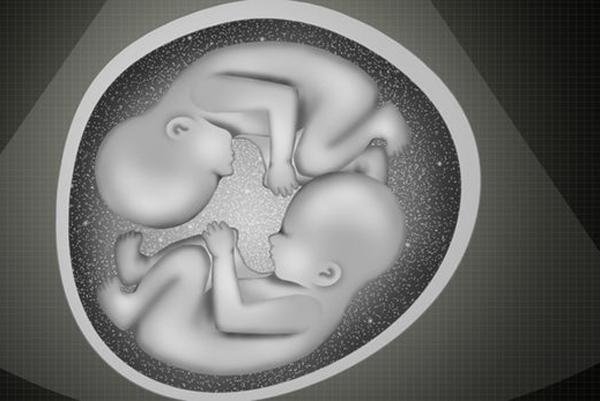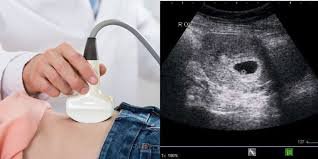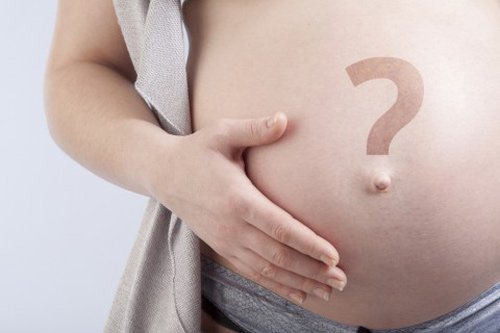Conjoined twins: Diagnosis and treatment
The article was professionally consulted with Specialist Doctor I Pham Thi Yen - Obstetrician-Gynecologist - Department of Obstetrics and Gynecology - Vinmec Hai Phong International General Hospital.
Conjoined twins are twins whose skin and some internal organs are conjoined. About 35% of conjoined twins survive for just one day, 40-60% of conjoined twins are stillborn, and only about 5-25% of conjoined twins have a chance of surviving to adulthood. Fort. Although there are different types of conjoined twins, the most common type is thoracic conjoined twins, which are conjoined in the upper body. In some cases, the twins are stuck together and have only one heart. Less common are conjoined twins, in which the twins are conjoined at the head or skull area.
1. Diagnosis of conjoined twins
Conjoined twins can be diagnosed by standard ultrasound as soon as the end of the first trimester. More detailed echocardiograms and echocardiograms can be used around half of the pregnancy to better determine how well the twins are connected and how their organs are functioning.
If the ultrasound detects conjoined twins, the doctor will perform a magnetic resonance imaging (MRI) scan to get more detailed information about where the conjoined twins are connected and which organs used together. Fetal MRI and fetal echocardiography aid in care planning during and after pregnancy.
If the ultrasound detects conjoined twins, the doctor will perform a magnetic resonance imaging (MRI) scan to get more detailed information about where the conjoined twins are connected and which organs used together. Fetal MRI and fetal echocardiography aid in care planning during and after pregnancy.
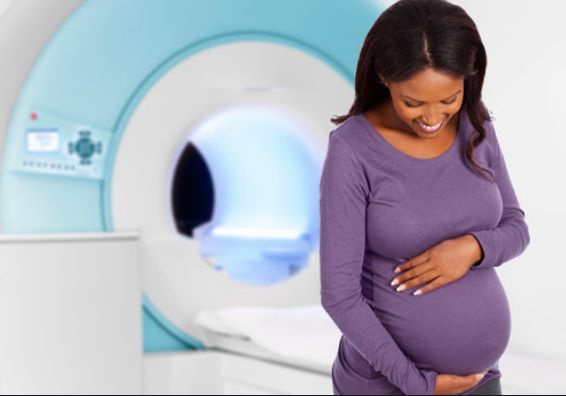
MRI thai nhi cho phép chẩn đoán hình ảnh về cặp song sinh dính liền
2. Treatment of conjoined twins
Treatment of conjoined twins depends on the location of the conjoined twins, the health of the baby, if the conjoined part includes internal organs, separation will be difficult because of the risks and risks. complications are quite high.
2.1. Monitoring during pregnancy
If you are carrying conjoined twins, you should be closely monitored throughout your pregnancy. You will be referred to a maternal and fetal medicine doctor and may also be referred to other specialists such as:
Pediatric surgeon Pediatric urologist Pediatric orthopedic surgeon Dr. plastic surgeons Pediatric Cardiologists Pediatric Cardiovascular Surgeons Neonatologists Doctors and others on your health care team learn as much about anatomy, functional abilities, and twins' prognosis to form a treatment plan for future twins.
After conjoined twins are born, the baby will be fully evaluated. With this information, you and members of your child's health care team can make decisions regarding your child's care and whether separation surgery is appropriate.
Pediatric surgeon Pediatric urologist Pediatric orthopedic surgeon Dr. plastic surgeons Pediatric Cardiologists Pediatric Cardiovascular Surgeons Neonatologists Doctors and others on your health care team learn as much about anatomy, functional abilities, and twins' prognosis to form a treatment plan for future twins.
After conjoined twins are born, the baby will be fully evaluated. With this information, you and members of your child's health care team can make decisions regarding your child's care and whether separation surgery is appropriate.

Mẹ bầu cần được các bác sĩ, chuyên gia chặt chẽ trong suốt quá trình thai kì
2.2. Separation surgery
A separation surgery is an elective procedure performed usually a year or more after birth to allow time for planning and preparation. Sometimes emergency separation may be needed if one of the twins is at risk of death, develops a life-threatening condition, or threatens the twins' survival.
Several complicating factors are considered key factors in making the decision whether or not separation surgery should be performed. Because of the variability and complications during and after surgery, performing conjoined twins surgery requires several considerations:
Whether the twins will join vital organs, such as heart? Will the twins be healthy enough to endure separation surgery? Separation success rate Type and extent of reconstructive surgery needed for each pair of twins after separation Type and level of functional support needed after separation Challenges twins face if conjoined .
Several complicating factors are considered key factors in making the decision whether or not separation surgery should be performed. Because of the variability and complications during and after surgery, performing conjoined twins surgery requires several considerations:
Whether the twins will join vital organs, such as heart? Will the twins be healthy enough to endure separation surgery? Separation success rate Type and extent of reconstructive surgery needed for each pair of twins after separation Type and level of functional support needed after separation Challenges twins face if conjoined .
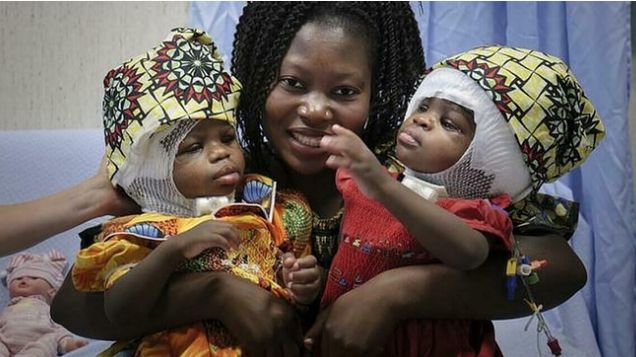
Hình ảnh hai bé song sinh Safa và Marwa đội mũ bảo vệ sau khi phẫu thuật tách, ngày 5/6. Nguồn ảnh: AP
Recent advances in prenatal diagnosis, health care, and anesthesia care have improved outcomes in separation surgery. After separation surgery, pediatric rehabilitation is critical to support appropriate skill development through physical, verbal and...
2.3. If surgery is not an option
If separation surgery is not possible or if the parents of the child decide not to opt for surgery, the doctors will help you meet the medical care needs of the twins. If the condition is severe, the child will be well cared for in terms of nutritional and water needs and may even require pain medication.
If during pregnancy, the twins have major health problems or the baby's life is threatened, your parents must struggle with difficult decisions for conjoined twins and future not sure of the child. Outcomes are sometimes difficult to determine, and surviving conjoined twins sometimes face enormous obstacles. Because conjoined twins are so rare, it can be difficult to find support, such as parents who are in the same situation. In this case, you should consult your healthcare provider or counselor if you need help. Depending on your needs, you can ask for information about organizations that assist parents with or have lost a child in a similar situation.
If you are pregnant with conjoined twins, you will be referred to a team of specialists to help guide you and create a treatment plan for the twins. Here's some information to help you get ready and what to expect from your doctor.
If during pregnancy, the twins have major health problems or the baby's life is threatened, your parents must struggle with difficult decisions for conjoined twins and future not sure of the child. Outcomes are sometimes difficult to determine, and surviving conjoined twins sometimes face enormous obstacles. Because conjoined twins are so rare, it can be difficult to find support, such as parents who are in the same situation. In this case, you should consult your healthcare provider or counselor if you need help. Depending on your needs, you can ask for information about organizations that assist parents with or have lost a child in a similar situation.
If you are pregnant with conjoined twins, you will be referred to a team of specialists to help guide you and create a treatment plan for the twins. Here's some information to help you get ready and what to expect from your doctor.

Nếu phẫu thuật không phải là một lựa chọn, thuốc giảm đau sẽ được chỉ định cho cặp song sinh dính liền
Before your appointment, you should consider bringing a family member or friend along: Sometimes it can be difficult to remember all of the information provided during an appointment. A person traveling with you can assist you with this if you have missed or forgotten. Also, don't forget to make a list of questions to ask your doctor. List the most essential and important questions to make the most of your appointment. Some basic questions to ask the doctor include:
What tests do twins need? What is the best treatment plan? Surgical separation an option? What is the likely outcome with separation? How many separation surgeries have been performed, and how many have been successful? What are the alternatives to the treatment you are suggesting? Which professionals should be on the healthcare team? Is there another specialist I should see? Where can I find family support? What documents can I refer to? If I choose to have more children, is there any chance that they could also be conjoined? Don't hesitate to ask other questions during your appointment with your doctor. They and the health care team will review your conjoined twins' tests and test results, and then discuss options with you. Together with the health care team, you can make decisions about your twins' treatment and care.
What tests do twins need? What is the best treatment plan? Surgical separation an option? What is the likely outcome with separation? How many separation surgeries have been performed, and how many have been successful? What are the alternatives to the treatment you are suggesting? Which professionals should be on the healthcare team? Is there another specialist I should see? Where can I find family support? What documents can I refer to? If I choose to have more children, is there any chance that they could also be conjoined? Don't hesitate to ask other questions during your appointment with your doctor. They and the health care team will review your conjoined twins' tests and test results, and then discuss options with you. Together with the health care team, you can make decisions about your twins' treatment and care.
3. Some conjoined twins are separated by surgery in Vietnam
Here are some cases of conjoined twins separated by surgery in Vietnam:
Vietnamese - German twins: This is the first surgery to separate conjoined twins in Vietnam with the participation of more than 70 people leading doctors in the country. The two brothers had their chest, abdomen, genitals and anus conjoined when they were born. The surgery was performed successfully, Duc's health gradually recovered, less fortunate, after the operation, Viet suffered from acute brain syndrome, a deep coma and later died. Conjoined twins Cuc - An: This is one of the complicated surgeries, with many potential risks because the two babies are conjoined in many parts of the abdomen, chest, liver, pericardial cavity, duodenum, small intestine, etc. In particular, An was born with a congenital heart defect. Doctors decided to separate surgery to save both babies after careful consideration.
Vietnamese - German twins: This is the first surgery to separate conjoined twins in Vietnam with the participation of more than 70 people leading doctors in the country. The two brothers had their chest, abdomen, genitals and anus conjoined when they were born. The surgery was performed successfully, Duc's health gradually recovered, less fortunate, after the operation, Viet suffered from acute brain syndrome, a deep coma and later died. Conjoined twins Cuc - An: This is one of the complicated surgeries, with many potential risks because the two babies are conjoined in many parts of the abdomen, chest, liver, pericardial cavity, duodenum, small intestine, etc. In particular, An was born with a congenital heart defect. Doctors decided to separate surgery to save both babies after careful consideration.
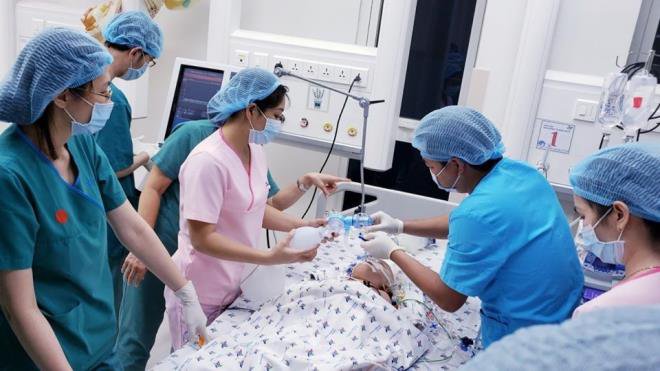
Ca phẫu thuật tách rời cặp song sinh Trúc Nhi và Diệu Nhi đã thành công tại Bệnh viện Nhi đồng Thành phố Hồ Chí Minh
Heart and liver conjoined twins Long - Phung: This was an extremely complicated surgery at that time. After the operation, baby Long was in good health, but Phung's condition changed drastically and died three months after the operation Cu Co twins: conjoined abdominal twins were operated on 15 days after birth. The surgery was successful, the internal organs are intact. Both babies are now leading healthy lives. Most recently, on July 15, 2020, nearly 100 doctors, nurses and staff at Children's Hospital of Ho Chi Minh City, in collaboration with 30 experts from major hospitals across the country, performed Long surgery to separate twins Truc Nhi and Dieu Nhi. Right from the time of birth, the twins are conjoined in the abdomen and pelvis. To date, the condition of both babies is stable. However, the two babies still need to be closely monitored, anti-ulcer, anti-infection, infection.
Để đặt lịch khám tại viện, Quý khách vui lòng bấm số HOTLINE hoặc đặt lịch trực tiếp TẠI ĐÂY. Tải và đặt lịch khám tự động trên ứng dụng MyVinmec để quản lý, theo dõi lịch và đặt hẹn mọi lúc mọi nơi ngay trên ứng dụng.
Reference source: mayoclinic.org
Bài viết này được viết cho người đọc tại Sài Gòn, Hà Nội, Hồ Chí Minh, Phú Quốc, Nha Trang, Hạ Long, Hải Phòng, Đà Nẵng.




